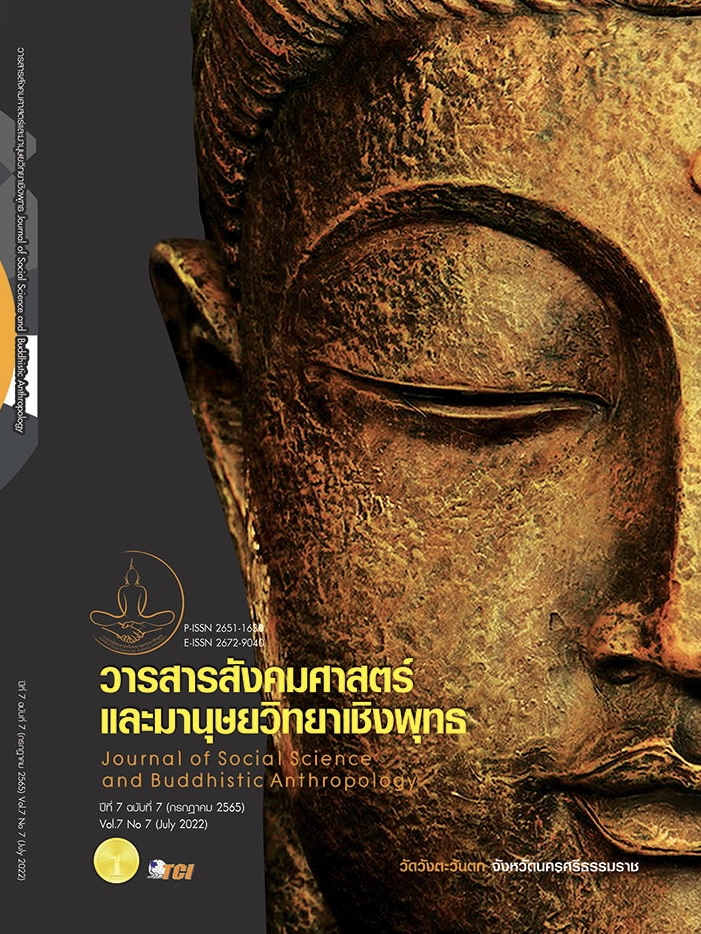DEVELOPMENT OF A MANAGEMENT MODEL FOR THE WORLD-CLASS STANDARD SCHOOLS FOR SUSTAINABILITY
Keywords:
Management, The World-Class Standard Schools, Sustainability, Research and Development, Developed ModelAbstract
The objective of this research article were to develop a management model for the world-class standard schools for sustainability. This was Research and Development (R&D). The population was 1,635 the world-class standard schools. A sample was divided into two groups as follows: 1) the sample for collecting basic data was 311 the world-class standard schools, using the cluster sampling method and the Craigie and Morgan sample size tables. 2) The sample for the model experiment is Suksanareewittaya School, using the purposive selection method. The research Instrument were questionnaires, assessment forms, observation forms, and record forms. Data were analyzed using mean, frequency, percentage, and content analysis. The results of the research found that 1) a management model for the world-class standard schools for sustainability contained the details of the model and guidelines for applying. The details of the model consisted of 1) the name of the model 2) the focus of the model and 3) the main characteristics of the model. Each component focused on the collaborative operations of all parties, including executives, personnel, and stakeholders. And managed by a quality system according to the Thailand Quality Award (TQA) criteria to lead to sustainable learning outcomes for students. The model assessment of suitability helpfulness and possibility was found that the suitability aspect was at the highest level ( = 4.57, S.D. = 0.30) and the usefulness was at the highest level (
= 4.69, S.D. = 0.24) The possibility aspect was at the highest level (
= 4.72, S.D. = 0.19) and the overall was at the highest level (
= 4.66, S.D. = 0.17)
References
กรวิทธ์ เลิศศิริโชติ. (2559). แนวทางการบริหารสถานศึกษาสู่โรงเรียนมาตรฐานสากลของโรงเรียนมัธยมวัดมกุฏกษัตริย์. ใน รายงานการวิจัย. โรงเรียนมัธยมวัดมกุฏกษัตริย์.
ชูเกียรติ วิเศษเสนา. (2554). รูปแบบการพัฒนาโรงเรียนมัธยมศึกษาสู่มาตรฐานสากล. ในหลักสูตรพัฒนานักบริหารระดับสูง กระทรวงศึกษาธิการ (นบส.ศธ.) รุ่นที่ 1. ใน รายงานการวิจัย. สถาบันพัฒนาครู คณาจารย์ และบุคลากรทางการศึกษาสำนักงานปลัดกระทรวงศึกษาธิการ.
ไพฑูรย์ จารุสาร. (2561). ประเมินโครงการพัฒนาคุณภาพโรงเรียนมาตรฐานสากล ตามเกณฑ์รางวัลคุณภาพ OBECQA โรงเรียนนวมินทราชินูทิศ หอวัง นนทบุรี. ใน รายงานการวิจัย. โรงเรียนนวมินทราชินูทิศ หอวัง นนทบุรี.
สารสนเทศโรงเรียนมาตรฐานสากล. (2561). ฐานข้อมูลมาตรฐานการปฏิบัติงานสรุปข้อมูลโรงเรียนมาตรฐานสากล แยกตามประเภท. เรียกใช้เมื่อ 22 มิถุนายน 2561 จาก http://203.159.154.154/mathayom/obecqa/count_standard.php
สำนักงานคณะกรรมการการศึกษาขั้นพื้นฐาน. (2555). แนวทางการจัดการเรียนรู้ในโรงเรียนมาตรฐานสากล ฉบับปรับปรุง. กรุงเทพมหานคร: ชุมนุมสหกรณ์การเกษตรแห่งประเทศไทย จำกัด.
สำนักงานคณะกรรมการการศึกษาขั้นพื้นฐาน. (2561). แนวทางการจัดการเรียนการสอนในโรงเรียนมาตรฐานสากลฉบับปรับปรุง. กรุงเทพมหานคร: ชุมนุมสหกรณ์การเกษตรแห่งประเทศไทย จำกัด.
อร่าม วัฒนะ. (2561). รูปแบบการบริหารสถานศึกษาสู่ความเป็นเลิศของโรงเรียนสังกัดองค์การบริหารส่วนจังหวัด. ใน ดุษฎีนิพนธ์ครุศาสตรดุษฎีบัณฑิต สาขาวิชาการบริหารการศึกษา. มหาวิทยาลัยราชภัฎนครสวรรค์.
อำไพ นงค์เยาว์. (2560). รูปแบบการบริหารสถานศึกษาเพื่อพัฒนานักเรียนให้มีทักษะการเรียนรู้ในศตวรรษที่ 21. วารสารการวิจัยเพื่อพัฒนาชุมชน (มนุษยศาสตร์และสังคมศาสตร์), 10(1), 132-143.
Bush, T. (2009). Theories of educational leadership and management. (3rd ed.). London: Great Britain, CPI Antony Rowe, Chippenham, Wilts.
Johnston, C. & Caldwell, B. (2021). Leadership and Organizational Learning in the Quest for World Class School. The International Journal of Educational Management, 15(2), 94-103.
Krejcie, R. V. & Morgan, D. W. (1970). Determining sample size for research activities. Educational and Measurement, 30(3), 607-610.
Ontario Learning for Sustainability Partnership (OLSP). (1996). Learning for Sustainability: Essential Outcomes and Classroom Learning Strategies. Toronto: OLSP.
UNESCO. (1997). Education for a Sustainable Future: A Transdisciplinary Vision for Concerned Action. Thessaloniki: UNESCO & The Government of Greece.
Downloads
Published
How to Cite
Issue
Section
License
Copyright (c) 2022 Journal of Social Science and Buddhistic Anthropology

This work is licensed under a Creative Commons Attribution-NonCommercial-NoDerivatives 4.0 International License.









